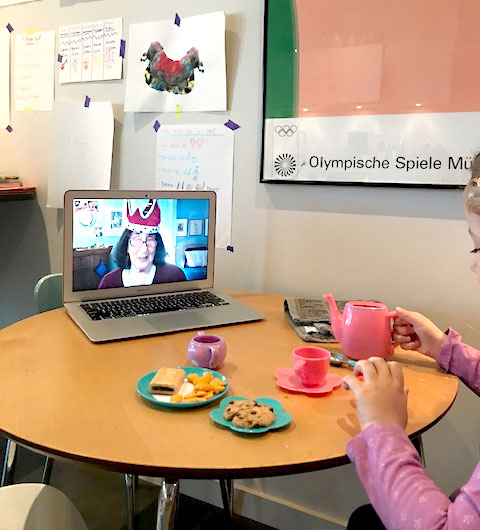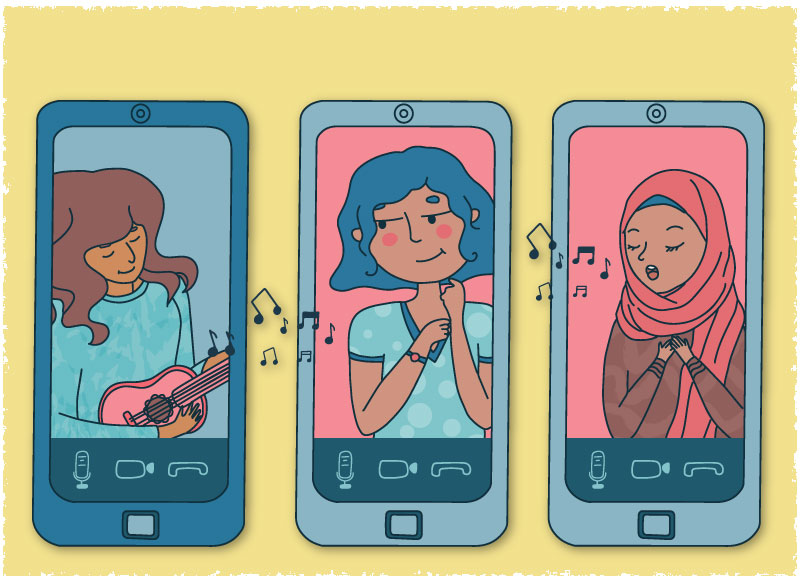Ideas for Reading, Playing, and Singing With Loved Ones Via Video | First Steps
Suggestions for family and caregivers who are virtually connecting with young children.
|
|
Yana Kalashnikova/Gettu Images |
Many grandparents and relatives love catching a glimpse of young family members on video chat. But it’s challenging to keep kids engaged for more than a few moments. While video chat is one of the few forms of screen time approved by the American Academy of Pediatrics for infants, it can also be chaotic and brief. These ideas use core early literacy practices to make the best of video encounters.
Playing
Play peekaboo. This game can last longer if you hide behind interesting things! Incorporate scarves, puppets, or masks to draw it out. Afterward, use the puppet to tell a simple story.
Play with Play-Doh. Dig out the toys like this that the grandkids and young relatives use when they visit. Take turns making things and showing each other your creations.
 |
A virtual tea party with Grandma |
Have a tea party. Bring out the tea sets! Drink (real tea, juice, or water), eat cookies or crackers, and wear fun hats. Take turns sipping tea while having a chitchat.
Play scavenger hunt. Send children on a hunt around the house for specific objects they will likely have.
Reading
Read a board book or picture book. Librarians can create a suggested book list for video chats. For babies and toddlers, choose titles with big, bold illustrations, rhyming words, or simple concepts like colors and shapes. Older toddlers and preschoolers can listen to longer stories—one or two a session. Some four- to six-year-olds can sit for longer stretches to enjoy a chapter book or early reader. Locate books that are available for those on both sides of the video.
Try nonfiction! It’s a great conversation starter. Encourage a family member to check out a library book or ebook on the child’s favorite topic. Readers don’t have to read the whole book—just what interests the child.
Share nursery rhymes and poetry. They’re short, playful, and many people know rhymes by heart. Make sure you include a few popular ebook anthologies for all family members to use.
Bring out licensed characters. Using a book about a favorite character may be a great way to get a young child’s attention. Familiar figures can get kids excited about reading.
Talking
Eat a meal together. Discuss what you are eating, how it tastes, and let toddlers show off new skills like eating with a fork or drinking from a cup. Young children may also be more contained, since they’ll be in a high chair!
Show and tell. Bring a stack of interesting toys, dolls, or stuffed animals. Introduce each one using descriptive language—make it silly! Toddlers can also introduce favorite toys.
Tell childhood stories. Young kids cherish tales from a loved one’s childhood. Ones where someone gets hurt or in trouble are often the most dramatic, or stories about life in “olden times.”
Play I Spy. Sit in front of an interesting backdrop, and take turns playing this fabulous, vocabulary-building game.
Singing
Songs, rhymes, and fingerplays. Singing is a great way to engage infants and toddlers; it slows down language so they can hear small letter sounds. Encourage family members to send the songs and rhymes they learn
at storytime to those they’re video chatting with so all
can share.
Create a family band. Bring instruments, or pots and pans, and do a call-and-response game. For example, shake your shaker three times, and encourage your conversation partner to do the same.
Tell families not to get discouraged if these activities don’t always work. As long as they try something new and different, they’ll create wonderful memories.

RELATED
The job outlook in 2030: Librarians will be in demand
The job outlook in 2030: Librarians will be in demand
ALREADY A SUBSCRIBER? LOG IN
We are currently offering this content for free. Sign up now to activate your personal profile, where you can save articles for future viewing






Add Comment :-
Be the first reader to comment.
Comment Policy:
Comment should not be empty !!!